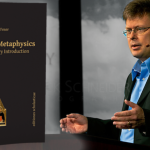Debunking the “One God Further” Objection
by Dr. Edward Feser
Filed under The Existence of God
Philosopher Bill Vallicella recently replied to what might be called the “one god further” objection to theism. Bill sums up the objection as follows:
"The idea, I take it, is that all gods are on a par, and so, given that everyone is an atheist with respect to some gods, one may as well make a clean sweep and be an atheist with respect to all gods. You don't believe in Zeus or in a celestial teapot. Then why do you believe in the God of Isaac, Abraham, and Jacob?"
Or as the Common Sense Atheism blog used to proclaim proudly on its masthead:
"When you understand why you dismiss all the other possible gods, you will understand why I dismiss yours."
I see that that blog has now removed this one-liner, which is a sign of progress. Because while your average atheists may regard the “one god further” objection as devastatingly clever, it is in fact embarrassingly inept.
Suppose someone skeptical about Euclidean geometry said:
"When you understand why you regard all the particular triangles you’ve observed as having sides that are less than perfectly straight, you will understand why I regard Euclidean plane triangles as such to have sides that are less than perfectly straight."
Or suppose a critic of Platonism said:
"When you understand why you regard the things of ordinary experience as in various ways imperfect or less than fully good instances of their kinds, you will understand why I regard Plato’s Form of the Good as being less than fully good."
Would these count as devastating objections to Euclidean geometry and Platonism? Would they serve as fitting mottos for blogs devoted to “Common Sense Anti-Euclideanism” or “Common Sense Anti-Platonism”? Obviously not. They would demonstrate only that the speaker didn’t know what he was talking about.
The “one god further” objection is no better than these “objections” would be. The “Common Sense Anti-Euclidean” objection supposes that the concept of a triangle as defined in textbooks of Euclidean geometry is merely one triangle alongside all the others that one comes across in traffic signs, dinner bells, and the like, only invisible and better drawn. But of course, that is not what it is at all. What the textbooks describe is not a triangle, not even an especially well-drawn one, but rather (Euclidean) triangularity itself, and the triangles one comes across in everyday experience are defective precisely because they fail to conform to the standard it represents. The “Common Sense Anti-Platonism” objection supposes that the Form of the Good is merely one more or less perfect or imperfect instance of some class or category alongside the other instances, albeit an especially impressive one. But of course, that is not what it is at all. The Form of the Good doesn’t have goodness in some more or less incomplete way; rather, it just is goodness, participation in which determines the degree of goodness had by things which do have goodness only in some more or less incomplete way.
Similarly, the “Common Sense Atheist” or “one god further” objection supposes that the God of classical theism is merely one further superhuman being alongside others who have found worshippers – Thor, Zeus, Quetzalcoatl, and so forth – only a superhuman being of even greater power, knowledge, and goodness than these other deities have. But of course, that is not what God is at all. He is not “a being” alongside other beings, not even an especially impressive one, but rather Being Itself or Pure Actuality, that from which all mere “beings” (including Thor, Zeus, and Quetzalcoatl, if they existed) derive the limited actuality or existence they possess. Neither does He “have” power, knowledge, goodness, and the like; rather, He is power, knowledge, and goodness (where the “participation” relation in Plato’s theory of Forms is transformed by the classical theist into a relation between created things and their uncaused cause, in light of the doctrine of divine simplicity – and also thereby transformed, by Thomists anyway, into a kind of efficient-causal relation).
Note that the “Common Sense Anti-Platonist” objection is a silly objection whether or not one accepts Platonism, and that the “Common Sense Anti-Euclidean” objection would be a silly objection whether or not one accepted Euclidean geometry. In the same way, the “Common Sense Atheist” or “one god further” objection would be a silly objection even if one had other grounds for rejecting classical theism. In all three cases, the objections represent a failure to understand even the fundamentals of the position one is attacking.
It is no good replying that lots of ordinary religious people conceive of God in all sorts of crude ways at odds with the sophisticated philosophical theology developed by classical theists – ways that make of God something like a glorified Thor or Zeus. The “man on the street” also believes all sorts of silly things about science – that Darwinism claims that monkeys gave birth to human beings, say, or that molecules are made up of little balls and sticks. But it would be preposterous for someone to pretend he had landed a blow against Darwinism or modern chemistry by attacking these silly straw men. Similarly, what matters in evaluating classical theism is not what your Grandpa or your Pastor Bob have to say about it, but rather what serious thinkers like Aristotle, Plotinus, Athanasius, Augustine, Anselm, Aquinas, Avicenna, Averroes, Maimonides, and countless others have to say.
Nor would it be any good to insist that the “one god further” objection is significant at least as a reply to the more anthropomorphic “theistic personalist” conception of God that has replaced the classical theist conception in the thinking of many modern theologians and philosophers of religion. For one thing, most theistic personalists, though they depart in significant (and in my view disastrous) ways from classical theism, are still committed to a far more sophisticated conception of God than purveyors of the “one god further” objection take as their preferred target. (Comparing God to the Flying Spaghetti Monster is not a serious reply to a theistic personalist like Alvin Plantinga or Richard Swinburne.) More importantly, purveyors of this objection take themselves to be presenting a serious criticism of Christianity, Judaism, Islam, and philosophical theism as such – not merely of this or that modern representative of these views – and the historically mainstream tradition in these religions and in philosophical theology is classical theist, not theistic personalist. Hence to fail to address the classical theist conception of God is ipso facto to fail seriously to address the claims of these traditions. In particular, unless one has made a serious study of philosophical theology as it has been developed within the Neo-Platonic, Aristotelian, Thomistic, and other Scholastic traditions, one’s understanding of traditional Christian, Jewish, and Islamic theology, not to mention philosophical theism, is simply infantile.
Here’s another way to look at the problem with the "one god further" objection. Suppose I go along with the gag. Why do I dismiss all other gods?
Well, in part because there is ample reason to think they do not exist. But also – and far more importantly – because even if they did exist, they would all in various respects be less than ultimate and thus would not be truly divine and worthy of worship. So, for example, if the gods of Olympus existed, we would expect to find them living atop Mount Olympus, and they don’t. But even if they did exist – suppose they return to Olympus when no one is looking, or reside in some other dimension as in the Marvel Comics version of the Olympian gods – they would all in various respects manifest limitations and defects that show them to be mere creatures like us, even if more grand creatures than we are. Hence, as we know from mythology, they are all supposed to suffer myriad limitations on their power, and to be motivated by various petty concerns. They also come into existence, just as we do.
In short, the gods of Olympus, or of any of the other pantheons for that matter, are all essentially finite, contingent beings like us, about as impressive as extraterrestrials – which might be very impressive indeed, of course, but still within the order of creation. In particular (and to be more philosophically precise) they would all be mixtures of actuality and potentiality and compounds of essence and existence; they would all be governed by principles outside themselves; and they would all be less than absolutely necessary in their existence and imperfect in their natures. And that means that, no less than we do, they would depend for their being on that which is Pure Actuality, that which is Being Itself (i.e. in which essence and existence are identical), that which exists in an absolutely necessary and independent way and in which all the diverse, derivative, and finite perfections manifest in the world of our experience exist in a united, underived, and infinite way. That is to say, they, no less than we, would depend for their being on the God of classical theism.
Therefore, in response to the “one god further” objection, nothing further need be said but this:
"When you understand why I dismiss all other gods, you’ll understand why I dismiss your “one god further” objection."
Related Posts
Note: Our goal is to cultivate serious and respectful dialogue. While it's OK to disagree—even encouraged!—any snarky, offensive, or off-topic comments will be deleted. Before commenting please read the Commenting Rules and Tips. If you're having trouble commenting, read the Commenting Instructions.













